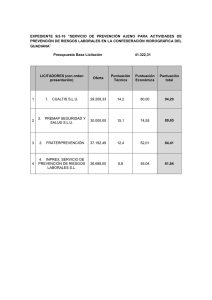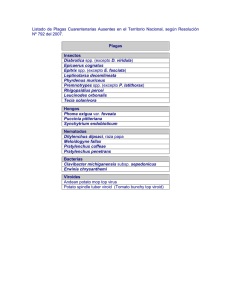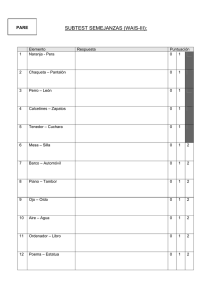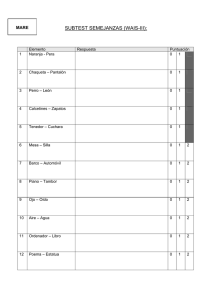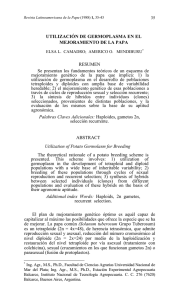2010/2011 - Universidad Politécnica de Madrid
Anuncio
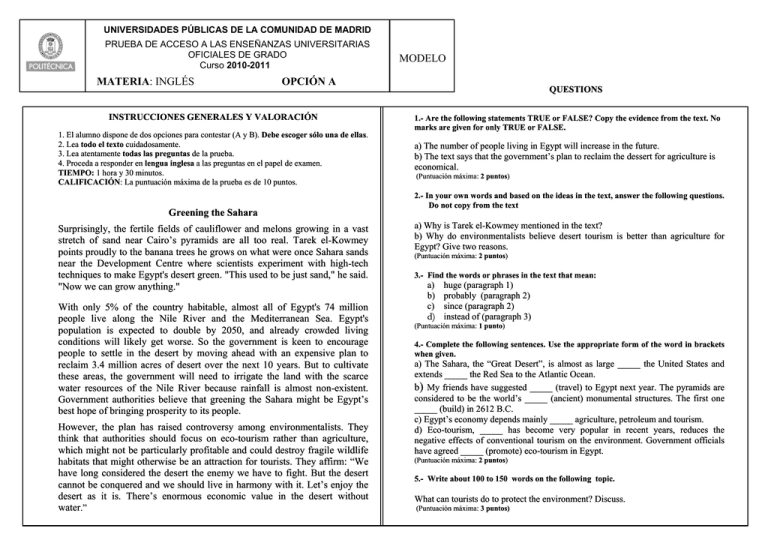
UNIVERSIDADES PÚBLICAS DE LA COMUNIDAD DE MADRID PRUEBA DE ACCESO A LAS ENSEÑANZAS UNIVERSITARIAS OFICIALES DE GRADO Curso 2010-2011 MATERIA: INGLÉS MODELO OPCIÓN A INSTRUCCIONES GENERALES Y VALORACIÓN 1. El alumno dispone de dos opciones para contestar (A y B). Debe escoger sólo una de ellas. 2. Lea todo el texto cuidadosamente. 3. Lea atentamente todas las preguntas de la prueba. 4. Proceda a responder en lengua inglesa a las preguntas en el papel de examen. TIEMPO: 1 hora y 30 minutos. CALIFICACIÓN: La puntuación máxima de la prueba es de 10 puntos. Greening the Sahara Surprisingly, the fertile fields of cauliflower and melons growing in a vast stretch of sand near Cairo’s pyramids are all too real. Tarek el-Kowmey points proudly to the banana trees he grows on what were once Sahara sands near the Development Centre where scientists experiment with high-tech techniques to make Egypt's desert green. "This used to be just sand," he said. "Now we can grow anything." With only 5% of the country habitable, almost all of Egypt's 74 million people live along the Nile River and the Mediterranean Sea. Egypt's population is expected to double by 2050, and already crowded living conditions will likely get worse. So the government is keen to encourage people to settle in the desert by moving ahead with an expensive plan to reclaim 3.4 million acres of desert over the next 10 years. But to cultivate these areas, the government will need to irrigate the land with the scarce water resources of the Nile River because rainfall is almost non-existent. Government authorities believe that greening the Sahara might be Egypt’s best hope of bringing prosperity to its people. However, the plan has raised controversy among environmentalists. They think that authorities should focus on eco-tourism rather than agriculture, which might not be particularly profitable and could destroy fragile wildlife habitats that might otherwise be an attraction for tourists. They affirm: “We have long considered the desert the enemy we have to fight. But the desert cannot be conquered and we should live in harmony with it. Let’s enjoy the desert as it is. There’s enormous economic value in the desert without water.” QUESTIONS 1.- Are the following statements TRUE or FALSE? Copy the evidence from the text. No marks are given for only TRUE or FALSE. a) The number of people living in Egypt will increase in the future. b) The text says that the government’s plan to reclaim the dessert for agriculture is economical. (Puntuación máxima: 2 puntos) 2.- In your own words and based on the ideas in the text, answer the following questions. Do not copy from the text a) Why is Tarek el-Kowmey mentioned in the text? b) Why do environmentalists believe desert tourism is better than agriculture for Egypt? Give two reasons. (Puntuación máxima: 2 puntos) 3.- Find the words or phrases in the text that mean: a) huge (paragraph 1) b) probably (paragraph 2) c) since (paragraph 2) d) instead of (paragraph 3) (Puntuación máxima: 1 punto) 4.- Complete the following sentences. Use the appropriate form of the word in brackets when given. a) The Sahara, the “Great Desert”, is almost as large _____ the United States and extends _____ the Red Sea to the Atlantic Ocean. b) My friends have suggested _____ (travel) to Egypt next year. The pyramids are considered to be the world’s _____ (ancient) monumental structures. The first one _____ (build) in 2612 B.C. c) Egypt’s economy depends mainly _____ agriculture, petroleum and tourism. d) Eco-tourism, _____ has become very popular in recent years, reduces the negative effects of conventional tourism on the environment. Government officials have agreed _____ (promote) eco-tourism in Egypt. (Puntuación máxima: 2 puntos) 5.- Write about 100 to 150 words on the following topic. What can tourists do to protect the environment? Discuss. (Puntuación máxima: 3 puntos) UNIVERSIDADES PÚBLICAS DE LA COMUNIDAD DE MADRID PRUEBA DE ACCESO A LAS ENSEÑANZAS UNIVERSITARIAS OFICIALES DE GRADO Curso 2010-2011 MATERIA: INGLÉS MODELO OPCIÓN B QUESTIONS INSTRUCCIONES GENERALES Y VALORACIÓN 1. El alumno dispone de dos opciones para contestar (A y B). Debe escoger sólo una de ellas. 2. Lea todo el texto cuidadosamente. 3. Lea atentamente todas las preguntas de la prueba. 4. Proceda a responder en lengua inglesa a las preguntas en el papel de examen. TIEMPO: 1 hora y 30 minutos. CALIFICACIÓN: La puntuación máxima de la prueba es de 10 puntos. 1.- Are the following statements TRUE or FALSE? Copy the evidence from the text. No marks are given for only TRUE or FALSE. a) The potato is grown all over the world. b) The number of inhabitants on our planet will remain stable. (Puntuación máxima: 2 puntos) The International Year of the Potato The potato is currently a worldwide star. The United Nations declared 2008 as “The International Year of the Potato”, with the goal of calling global attention to the important role of this nutritious plant. Only in Antarctica is the potato neither cultivated nor consumed. The potato was domesticated by pre-Colombian farmers eight thousand years ago from species that grew in the wild near Lake Titicaca. For the residents of the Andes, the potato represents an irreplaceable product in their daily diet and, during many centuries, they selected potatoes based on their flavour and resistance against the adverse climate of the Andes. However, it’s not just that: the vegetable is a part of their culture and way of life, being integral to certain legends and traditions. The International Year of the Potato is raising awareness of the key role played by the "humble tuber" in agriculture, the economy and world food security. The potato should be a major component in strategies aimed at providing nutritious food for the poor and hungry. This “food of the future” is ideally suited to places where land is limited and labour is abundant, conditions that characterize much of the developing world. The potato produces more nutritious food more quickly, on less land, and in harsher climates than any other major crop. Over the next two decades, the world's population is expected to grow on average by more than 100 million people a year. Over 95 percent of that increase will occur in developing countries. The potato will surely be an important part of efforts to meet those challenges. 2.- In your own words and based on the ideas in the text, answer the following questions. Do not copy from the text a) What is the objective of the “International Year of the Potato”? b) What does the potato mean to the population of the Andes? (Puntuación máxima: 2 puntos) 3.- Find the words in the text that mean: e) f) g) h) objective (paragraph 1) taste (paragraph 2) plentiful (paragraph 3) without doubt (paragraph 3) (Puntuación máxima: 1 punto) 4.- Complete the following sentences. Use the appropriate form of the word in brackets when given. a) The potato, _____ was an important part of the diet of ancient tribes_____ South America, is now seen as the food of the future. b) Being better adapted to harsh climates, the potato plant is_____ (strong) and _____ (productive) than other crops. c) The potato _____ (introduce) into third world countries in an attempt _____ (solve) the world food crisis. d) Indirect speech. Rewrite the question beginning with the words given. “Will the new food policy be successful?” politicians asked. Politicians asked ___________________________________ (Puntuación máxima: 2 puntos) 5.- Write about 100 to 150 words on the following topic. How could the problem of hunger in the world be solved? Give your ideas. (Puntuación máxima: 3 puntos) INGLÉS CRITERIOS ESPECÍFICOS DE CORRECCIÓN TIEMPO: 1 hora y 30 minutos La prueba consistirá en el “análisis” de un texto de un idioma extranjero (el inglés en este caso), del lenguaje común, no especializado. El alumno dispone de dos opciones para contestar (A y B). Debe escoger sólo una de ellas. A partir del texto propuesto, el estudiante realizará un comentario personal y responderá a cuestiones relacionadas con el texto, que serán planteadas y respondidas por escrito en el mismo idioma, sin ayuda de diccionario ni de ningún otro manual didáctico. El texto contendrá alrededor de 250 palabras y su comprensión no exigirá conocimientos especializados ajenos a la materia de la prueba. La dificultad del texto estará controlada, a fin de permitir al alumno que realice la misma en el tiempo previsto. La puntuación total del examen será de 10 puntos. Al comienzo de la prueba se incluirán unas instrucciones generales para la realización de la misma en lengua castellana. El resto de la prueba estará totalmente redactada en inglés, y el alumno usará exclusivamente la lengua inglesa en sus respuestas. Valoración objetivos de cada una de las preguntas: Pregunta 1: Hasta 2 puntos. Se trata de medir exclusivamente la comprensión lectora. El alumno deberá decidir si dos frases que se le presentan son verdaderas o falsas, copiando a continuación únicamente el fragmento del texto que justifica su elección. Se otorgará 1 punto por cada apartado. Se calificará con 0 puntos la opción elegida que no vaya justificada. Pregunta 2: Hasta 2 puntos. Se pretende comprobar dos destrezas: la comprensión lectora y la expresión escrita, mediante la formulación de dos preguntas abiertas que el alumno deberá contestar basándose en la información del texto, pero utilizando sus propias palabras en la respuesta. Cada una de las preguntas valdrá 1 punto, asignándose 0,5 puntos a la comprensión de la pregunta y del texto, y 0,5 a la corrección gramatical de la respuesta. Pregunta 3: Hasta 1 punto. Esta pregunta trata de medir el dominio del vocabulario en el aspecto de la comprensión. El alumno demostrará esta capacidad localizando en el/los párrafo/s que se le indica un sinónimo adecuado al contexto, de cuatro palabras o definiciones. Se adjudicará 0,25 por cada apartado. Pregunta 4: Hasta 2 puntos. Con esta pregunta se pretenden comprobar los conocimientos gramaticales del alumno, en sus aspectos morfológicos y/o sintácticos. Se presentarán oraciones con huecos que el alumno deberá completar/rellenar. También podrán presentarse oraciones para ser transformadas, u otro tipo de ítem. Se adjudicará 0,25 a cada “hueco en blanco”, y en el caso de las transformaciones o ítems de otro tipo se concederá 0,5 con carácter unitario. Pregunta 5: Hasta 3 puntos. Se trata de una composición -de 100 a 150 palabras- en la que el alumno podrá demostrar su capacidad para expresarse libremente en lengua extranjera. Se propondrá una única opción y se otorgarán 1,5 puntos por el buen dominio de la lengua –léxico, estructura sintáctica, etc.- y 1,5 por la madurez en la expresión de las ideas -organización, coherencia y creatividad. INGLÉS SOLUCIONES OPCIÓN A SUGGESTED ANSWERS: Question 1 a) True. Egypt's population is expected to double by 2050….. b) False. So the government is keen to encourage people to settle in the desert by moving ahead with an expensive plan to reclaim 3.4 million acres of desert over the next 10 years. Question 2 (Key Ideas) a) Tarek el-Kowmey is proud of his crops / he farms near the Development Centre that is working with sophisticated techniques to green the desert / he cultivates his crops on fertile land that used to be just sand. b) Desert tourism can be more profitable (it brings in more money) and will not destroy fragile flora and fauna (possible attraction for tourists). Question 3 a) vast b) likely c) because d) rather than Question 4 a) as.............from b) travelling/traveling ……… most ancient………..was built c) on d) which…………to promote INGLÉS SOLUCIONES OPCIÓN B SUGGESTED ANSWERS: Question 1 a. False. Only in Antarctica is the potato neither cultivated nor consumed. b. False. Over the next two decades, the world's population is expected to grow on average by more than 100 million people a year. Question 2 (Key ideas) a. call global attention to the important role of this nutritious plan / raise awareness of the key role played by the "humble tuber" in agriculture, the economy and world food security. b. Apart from being a staple food, it has played a role in their history, traditions and culture. Question 3 a. goal b. flavour c. abundant d. surely Question 4 a. which ............ in/of b. stronger ………… more productive c. was introduced ………… to solve d. Politicians asked if/whether the new food policy would be successful.
